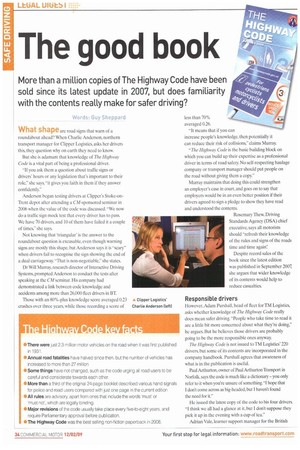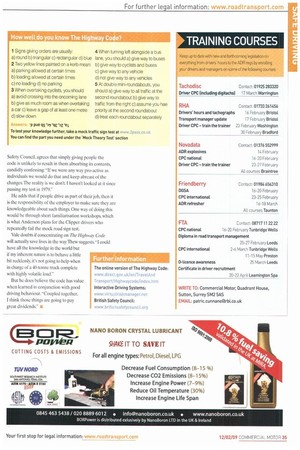The good book
Page 34

Page 35

If you've noticed an error in this article please click here to report it so we can fix it.
More than a million copies of The Highway Code have been sold since its latest update in 2007, but does familiarity with the contents really make for safer driving?
Words: Guy Sheppard
What shape are road signs that warn of a roundabout ahead? When Charlie Anderson, northern transport manager for Clipper Logistics, asks her drivers this, they question why on earth they need to know.
But she is adamant that knowledge of The Highway Code is a vital part of being a professional driver.
"If you ask them a question about traffic signs or drivers hours or any legislation that's important to their role," she says, "it gives you faith in them if they answer confidently" Anderson began testing drivers at Clipper's Stoke-onTrent depot after attending a CM-sponsored seminar in 2006 when the value of the code was discussed. "We now do a traffic sign mock test that every driver has to pass. We have 70 drivers, and 10 of them have failed it a couple of times," she says.
Not knowing that 'triangular' is the answer to the roundabout question is excusable, even though warning signs are mostly this shape. but Anderson says it is "scary" when drivers fail to recognise the sign showing the end of a dual carriageway "That is non-negotiable," she states.
Dr Will Murray, research director of Interactive Driving Systems, prompted Anderson to conduct the tests after speaking at the CM seminar. His company had demonstrated a link between code knowledge and accidents among more than 26,000 fleet drivers in BT.
Those with an 80%-plus knowledge score averaged 0.23 crashes over three years, while those recording a score of less than 70% averaged 0.26.
"It means that if you can increase people's knowledge, then potentially it can reduce their risk of collisions," claims Murray.
-The Highway Code is the basic building block on which you can build up their expertise as a professional driver in terms of road safety. No self-respecting haulage company or transport manager should put people on the road without giving them a copy."
Murray maintains that doing this could strengthen an employer's case in court, and goes on to say that employers would be in an even better position if their drivers agreed to sign a pledge to show they have read and understood the contents.
Rosemary Thew, Driving Standards Agency ([)SA) chief executive, says all motorists should "refresh their knowledge of the rules and signs of the roads time and time again': Despite record sales of the book since the latest edition was published in September 2007, she argues that wider knowledge of its contents would help to reduce casualties.
Responsible drivers However, Adam Purshall, head of fleet for TM Logistics, asks whether knowledge of The Highway Code really does mean safer driving. "People who take time to read it are a little bit more concerned about what they're doing," he argues. But he believes those drivers are probably going to be the more responsible ones anyway.
The Highway Code is not issued to TM Logistics' 220 drivers, but some of its contents are incorporated in the company handbook. Purshall agrees that awareness of what is in the publication is useful.
Paul Arthurton, owner of Paul Arthurton Transport in Norfolk. says the code is much like a dictionary— you only refer to it when you're unsure of something. "I hope that I don't come across as big-headed, but f haven't found the need for it."
He issued the latest copy of the code to his four drivers. "1 think we all had a glance at it, hut I don't suppose they pick it up in the evening with a cup of tea."
Adrian Vale, learner support manager for the British Safety Council, agrees that simply giving people the code is unlikely to result in them absorbing its contents, candidly confessing: "If we were any way pro-active as individuals we would do that and keep abreast of the changes The reality is we don't. I haven't looked at it since passing my test in 1979."
He adds that if people drive as part of their job, then it is the responsibility of the employer to make sure they are knowledgeable about such things. One way of doing this would be through short familiarisation workshops, which is what Anderson plans for the Clipper drivers who repeatedly fail the mock road sign test.
Vale doubts if concentrating on The Highway Code will actually save lives in the way Thew suggests "I could have all the knowledge in the world but if my inherent nature is to behave a little bit recklessly, it's not going to help when in charge of a 40-tonne truck complete with highly volatile load."
But he does believe the code has value when learned in conjunction with good driving behaviour. "Coupled together, I think those things are going to pay great dividends." a
































































































































































